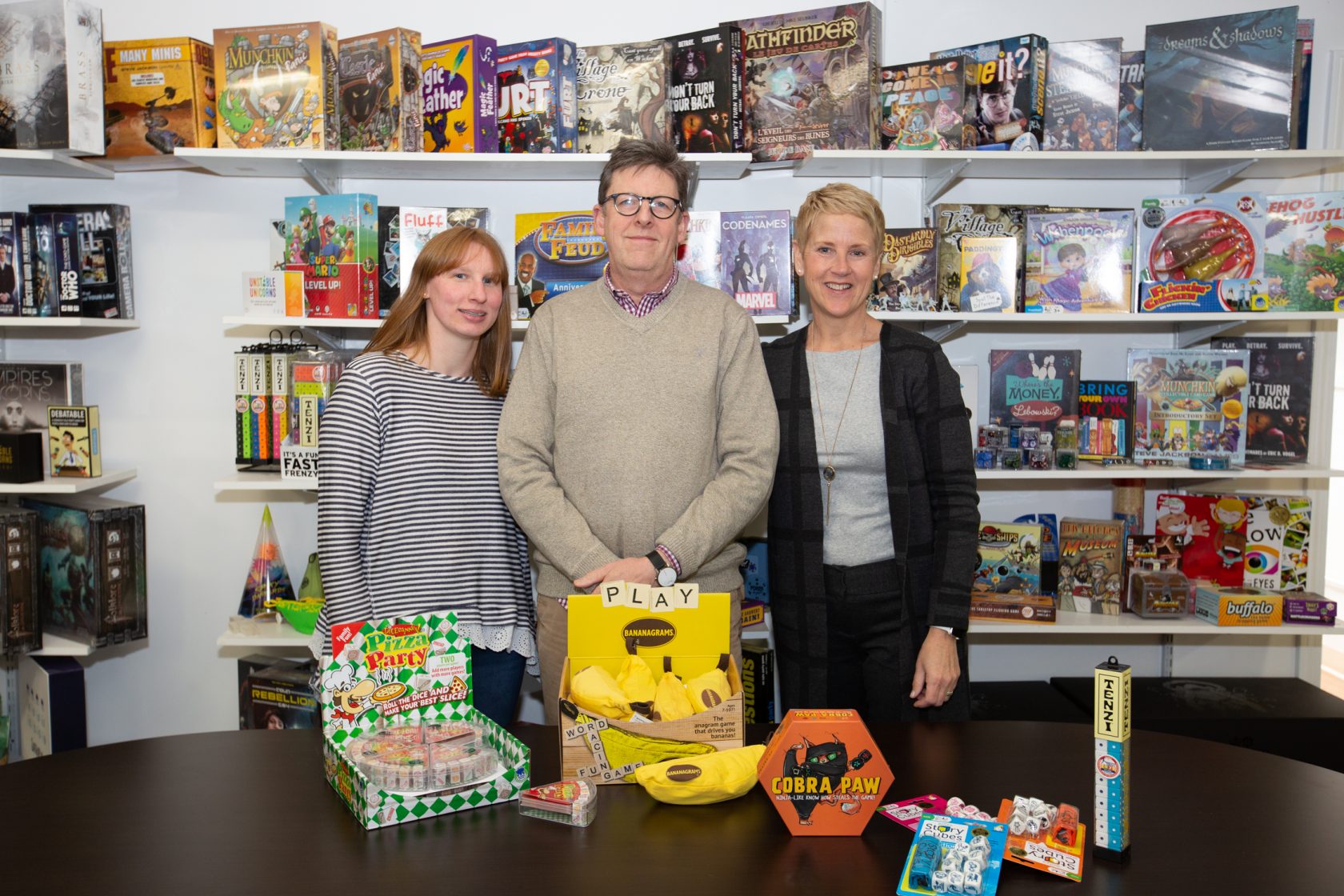
Mike Fisher, owner of Grand Prix International, Inc., boxes up toys for MHA’s clients with an Acquired Brain Injury (ABI) or intellectual disability. (Photo courtesy MHA)
SPRINGFIELD – Mike Fisher, owner of Grand Prix International, Inc., an Indian Orchard based product management company for the toy industry, has made a donation of nearly 300 games to MHA to encourage creative and imaginative interaction for the agency’s clients with an Acquired Brain Injury (ABI) or intellectual disability.
“Grand Prix International acts a value-added middleman between customers who want to focus on the design and marketing of games, and the factories that want to focus on manufacturing games,” Fisher explained. “Our help can involve design, packaging, materials, costing, contracting with the factory in China to manufacture it, and managing functions such as trade forwarding, importing and independent product safety testing.”
As Fisher explained, in the process of helping customers bring their games to market, Grand Prix International routinely receives samples and inventories of the products. “We frequently send these samples to other customers or prospects, as a product resume of sorts. At the end of the year we donate any games we still have to nonprofit organizations that we think can benefit from them. After talking with Kim Lee from MHA and learning about their programs for people with an acquired brain injury, I realized we had games involving words, storytelling, counting and matching colors that could be helpful because they all involve cognitive skills. We had three different games that fit the need, including Bananagrams, Rory’s Story, and Tenzi, and we donated them all—close to 300 games—to MHA.”

Mike Fisher, owner of Grand Prix International, Inc., center is seen with Kimberley A. Lee, VP of Resource Development and Branding for MHA, right, and Emily Good with some of the toys donated by Fisher’s company. (Photo courtesy MHA)
Sara Kyser, Vice President of Acquired Brain Injury Services for MHA, said that every day at The Resource Center, MHA staff see firsthand the great benefits that games like those being donated can offer. “The social engagement alone is valuable, but not nearly the end of it,” she explained. “Memory, dexterity, and speech are major areas affected by brain injuries and rebuilding these skills happens best when done in fun, creative ways. Board games allow these skills to be worked on in a socially typical manner, with the added benefit of engaging with others. This donation of games is going to provide a lot of people with the opportunity to rebuild some of their independence.”
Kimberley A. Lee, VP of Resource Development and Branding for MHA, said the cognitive and physical elements involved in playing the games, along with the fun aspects of socialization, can combine to provide potential therapeutic benefits. “MHA’s Resource Center already hosts clients with ABI or intellectual disabilities for therapeutic and socialization programs for people who vary in age from young adults to seniors, and these games will help us offer them an even better experience,” Lee explained. “We are also opening two ABI residences in Wilbraham early in 2019. I can envision MHA’s residents and program participants sitting together at the kitchen table, listening to music, enjoying some refreshments and, with facilitated support from MHA’s staff, enjoying a game night with friends and family. The donation of games from Grand Prix and the Fisher family makes this opportunity possible and we are thankful for their thoughtfulness and generosity.”
Paul Walting, MD, a Springfield-based neurologist board-certified in clinical neurophysiology, neurology, and sleep medicine, said he believes people with brain injury can benefit from rehab that includes occupational therapy and physical therapy enhanced by playing games. “Games such as those donated by Grand Prix International could be used to help people with language or speech problems or aphasia to modify their behavior through memory challenges, object recognition, naming, or creating a story and keeping a story line evolving,” said Walting. “The games are based on common, day-to-day skills involving math, spelling, memory, and storytelling, which may help persons with an ABI to ‘retrain their brain’ and prepare them for greater involvement in their lives and community.”
Walting added that playing with others introduces a socialization element, which may help people with an ABI to reinforce various cognitive attributes in ways that are more fun than simply counting coins or doing rehab exercise on a computer. “For people with social deficits, there is the opportunity for social engagement, taking turns, cooperating, and sharing,” Walting said. “I think game play is a good idea to strengthen executive functioning skills, such as paying attention, planning, organizing, and staying focused on a task to completion, and doing it in a social atmosphere rather than alone keeps people engaged. Challenging people, getting them thinking and interacting in different settings where fun is part of the experience—all of that can figure in. There is not a lot of formal research dedicated to the impacts of this kind of game play on persons with ABI, but empirical evidence is that game-based rehab in general helps the process.”






